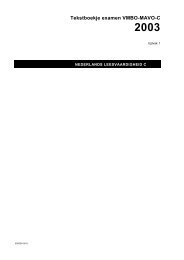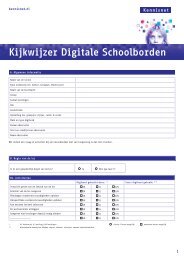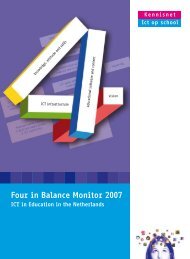Four in Balance Monitor 2011 - downloads.kennisn... - Kennisnet
Four in Balance Monitor 2011 - downloads.kennisn... - Kennisnet
Four in Balance Monitor 2011 - downloads.kennisn... - Kennisnet
You also want an ePaper? Increase the reach of your titles
YUMPU automatically turns print PDFs into web optimized ePapers that Google loves.
1.3 The <strong>Four</strong> <strong>in</strong> <strong>Balance</strong> <strong>Monitor</strong><br />
1 - WhAT IS FoUr IN BALANCE?<br />
Benchmark<br />
The <strong>Four</strong> <strong>in</strong> <strong>Balance</strong> <strong>Monitor</strong> provides figures on how Dutch schools<br />
<strong>in</strong>tegrate ICT <strong>in</strong>to teach<strong>in</strong>g and the results they achieve by do<strong>in</strong>g so. The<br />
data reveal trends and offer schools a benchmark for compar<strong>in</strong>g their<br />
own situation with those of other educational <strong>in</strong>stitutions (Chapters 3 to<br />
8). The <strong>Monitor</strong> covers the three sectors <strong>in</strong> which <strong>Kennisnet</strong> is <strong>in</strong>terested:<br />
primary education, secondary education, and vocational education and<br />
tra<strong>in</strong><strong>in</strong>g. When discuss<strong>in</strong>g research on primary education that does not<br />
<strong>in</strong>clude special education, we refer simply to primary education.<br />
In addition to survey<strong>in</strong>g the current state of affairs, the <strong>Monitor</strong> reviews<br />
what research has taught us about the benefits of ICT (Chapter 2). The <strong>Four</strong><br />
<strong>in</strong> <strong>Balance</strong> <strong>Monitor</strong> shows that we are gradually acquir<strong>in</strong>g more knowledge<br />
of the effects of ICT. At the same time, this publication also shows that<br />
there are still many questions concern<strong>in</strong>g the long-term benefits of ICT<br />
<strong>in</strong> education. By systematically generat<strong>in</strong>g new knowledge and provid<strong>in</strong>g<br />
the latest <strong>in</strong>formation about what does and does not work, we aim to<br />
help schools select the ICT applications that will improve their pupils’<br />
performance. Such <strong>in</strong>formation can also help developers, educational<br />
support staff, policymakers, and commercial parties meet the support<br />
needs of schools that utilize ICT.<br />
Sources<br />
What we know about the benefits of ICT is based on the results of<br />
<strong>in</strong>dependent research. A considerable percentage of that research has been<br />
carried out on behalf of <strong>Kennisnet</strong> by various research <strong>in</strong>stitutions with<strong>in</strong><br />
the context of the “Mak<strong>in</strong>g Knowledge of Value” [Kennis van Waarde Maken]<br />
research program. This program also covers closely related research<br />
projects, for example “Learn<strong>in</strong>g with more effect” [Leren met meer effect],<br />
EXPo and EXMo (see also Chapter 2).<br />
To show how the current situation compares with previous years, we<br />
present comparative data collected <strong>in</strong> previous studies. We also use data<br />
taken from other Dutch and <strong>in</strong>ternational studies to help us understand<br />
13








